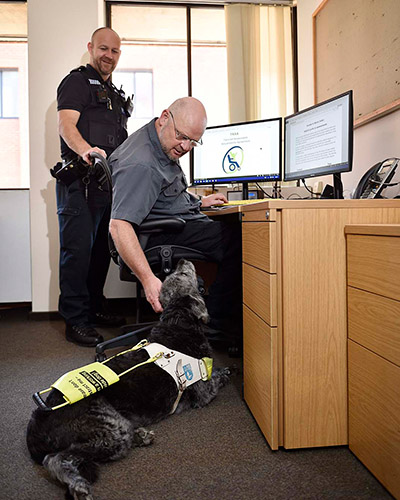Conversation with David Smith, Equality and Diversity Advisor (Disability) for Thames Valley Police

What made you join Thames Valley Police (TVP)?
I have previously worked for a number of police forces, as an Equality and Diversity advisor there. I then decided that I wanted to go and work for myself and set up my own company, however soon after I was approached by TVP for the same role, but a part-time job share, which I thought was perfect, because it allowed me to work flexibly.
What is RAMP, and how have you been involved in its development?
RAMP stands for Reasonable Adjustment Management Process;
When I joined TVP, we were providing reasonable adjustments for employees as and when they were requested, but the process needed improving. Other forces had been adopting something similar to RAMP, such as West Midlands Police and Northamptonshire Police, where I originally developed the process.
TVP’s RAMP is a robust and comprehensive management process, which helps remove barriers that disadvantage disabled employees in the work place, and is available for new and existing officers, staff and volunteers. Our RAMP process is a win-win situation, as it enables us to provide our employees with the support that they need whilst allowing the force to keep track of the process and evolve it as needed.
RAMP has also contributed to TVP’s Disability Confident status, progressing to “Employer” status.
Did you receive the support you needed when you joined TVP?
TVP was overall good and doing quite well at providing reasonable adjustments.
I would say that there are two key aspects that employers and employees should keep in mind when discussing reasonable adjustments:
- The employer has to inform the employee of the support available through the RAMP process,
- The employee should be encouraged to provide as much information about the support they need.
When I joined TVP, I knew what support I needed, so I knew what to ask for. However, there might be people who might not be comfortable talking about their disability, and they may not want to raise their head through the parapet because of previous experiences of discrimination and fear that it might happen to them again.
Our recruitment teams know to promote the RAMP process as early as possible for anybody that applies to join the force who may require reasonable adjustments.
How has Darcy adjusted to working for TVP?
Sometimes people are more excited to see Darcy than me! I long got used to the attention that she gets. Darcy, my guide dog, is trained to sit on a bed next to me, no matter where I am. She is so placid, we’ve actually used her to help encourage people to be less scared of dogs.
There are however times when you have to remind people how to behave around a guide dog. With Darcy, there are some basic rules, such as don’t hassle her when she’s working; I am happy for people to engage with her, but it has to be when it is appropriate for them to do it. The majority of people are really good, and she is very popular, as you can imagine.
Is there anything in particular that people should be aware of when it comes to disability and about TVP’s work in this area?
What we are trying to do is to encourage and create an environment where if you have a disability and you want to talk to somebody about it, or you feel that you want support, but you’ve been too anxious to be open about it, now is a good time to come forward. Everything that we are doing is to encourage other people to come forward, to say that they are struggling and they need support.
As a Disability Confident Employer, TVP aims to go the extra mile to make sure current and future disabled employees are supported and treated fairly at work, giving them the opportunity to reach their full potential and make a positive impact.
We are also looking at how we can support our community members with disabilities. One of our most recent developments is Visual Impairment Protocol (VIP), which enables police officers to identify themselves to blind and visually impaired people when they visit their home. An article about VIP is available at New police protocol launched to assist blind and visually impaired people.


 Facebook
Facebook
 Twitter
Twitter
 Linkedin
Linkedin
 Instagram
Instagram